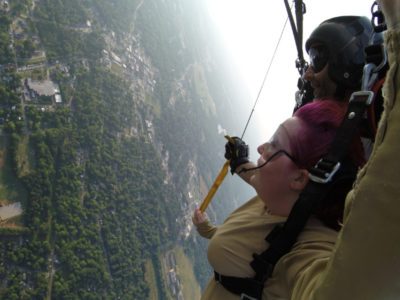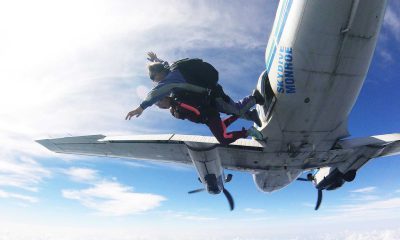Skydiving is a unique sport that not only tests the limits of your mental fitness but your physical fitness as well. Our sport is performed at higher-than-normal altitudes, which is why there are certain health considerations to be made before scheduling a jump. Based on our experience, we’ve narrowed down a few medical conditions that should be considered before making a skydive. Please be advised that although we know a heck of a lot about skydiving, we are not medical doctors and urge you to consult a trained physician before making the decision to jump. So, what health risks are associated with skydiving, how can skydiving affect your health and what are the long-term effects of skydiving?
Can You Skydive with Asthma?
At higher elevations, the air tends to get “thinner” with less oxygen available for us to take in, which causes our bodies to work harder to take in the same amount of oxygen as it does at lower elevations. If you have breathing problems, this may be a concern for you. If your asthma is controlled, skydiving may be a non-issue for you. However, those with chronic bronchitis, emphysema, and severe asthma should consult a physician before deciding to skydive. Due to the air pressure changes from traveling higher than 8,000 feet, we do NOT recommend skydiving if you have pneumothorax or a collapsed lung.
Can You Skydive with High Blood Pressure?
 Can you skydive if you have high blood pressure? Skydiving is a blood-pumping, adrenaline-filled activity that can really get your heart racing. And for someone who is already diagnosed with high blood pressure, the risk might not be worth it to you. The combination of low oxygen levels, pressure changes, and adrenaline spikes could be a recipe for a bad time. With that being said, there are many individuals with high blood pressure that have no issues with skydiving! The best way to know is to consult with your physician before going skydiving.
Can you skydive if you have high blood pressure? Skydiving is a blood-pumping, adrenaline-filled activity that can really get your heart racing. And for someone who is already diagnosed with high blood pressure, the risk might not be worth it to you. The combination of low oxygen levels, pressure changes, and adrenaline spikes could be a recipe for a bad time. With that being said, there are many individuals with high blood pressure that have no issues with skydiving! The best way to know is to consult with your physician before going skydiving.
Can You Skydive with a Heart Condition?
Can you skydive with heart problems? If you have a congenital heart disease, arrhythmia, or other heart problem that concerns you, we suggest speaking with your physician before attempting a skydive. It’s important to consider the risks carefully if you’ve had a heart attack, have a heart murmur, or use a pacemaker before deciding to skydive. Of course, we want you to skydive, but more importantly, we want you to be safe! Once you’re cleared to jump, please let one of our team members know of your medical condition before you jump so we can be prepared.
Medical Conditions That Prevent Skydiving
So, who should not go skydiving? Here are some other medical conditions that may stop you from skydiving:
- Weight
- Neck/Back Injuries
- Pregnancy
- Epilepsy
- Diabetes
- Osteoporosis
- Sinus Issues/Colds
What are the Negatives of Skydiving?
So, with all of this being considered, is skydiving bad for your health? Having a medical issue as a result of skydiving with no other pre-existing conditions is a rarity. However, those with pre-existing conditions are at a higher risk of having a medical emergency such as a heart attack or passing out while skydiving.
It’s important to note that out of 3.9 million jumps performed in the US in 2022, the USPA recorded 20 fatal skydiving accidents amongst licensed skydivers. That’s a fatality rate of 1 in every 195,000 jumps. Over the past 10 years, tandem skydiving has seen an average of 1 fatality per 500,000 jumps.
While it is not the cause of most skydiving accidents amongst skydivers, experiencing an underlying medical problem while skydiving was the cause of 10%, or 2, fatalities documented in 2022 according to the United States Parachute Association (USPA). The cause of most skydiving accidents is human error — usually intentional low turns performed by experienced skydivers — and not the result of equipment malfunction.
What are the Positives of Skydiving?
 Skydiving has so many physical, mental, and social benefits that it’s almost too hard to measure exactly how beneficial skydiving is!
Skydiving has so many physical, mental, and social benefits that it’s almost too hard to measure exactly how beneficial skydiving is!
For starters, skydiving is technically a sport so you will reap the physical benefits that come from any other sport. The freefall portion alone has a way of engaging muscles that you probably never even knew you had. Even tandem skydivers require a bit of strength, mobility, and flexibility when navigating the aircraft, freefalling, and lifting their legs when landing.
Licensed skydivers experience a whole ‘nother level of stamina, endurance, and strength. Between lifting heavy gear, flying their bodies in interesting positions in the sky, using their arms/core to steer the canopy, landing, walking to and from the hangar and landing area, and even packing their parachutes back up into their rigs. Whew! Skydiving can be exhausting for a skydiver but oh so fulfilling!
Skydiving releases the floodgates of all your favorite “feel-good” hormones like serotonin, dopamine, and adrenaline. These lovely chemicals increase oxygen uptake, improve brain function, memory, and attention, and will have you feeling superhuman! These awesome life-changing benefits can even last 20-60 minutes following a skydive, so soak it in for as long as you can. You’ll understand why skydivers keep jumping!
Cleared to jump, or have more questions? Contact a team member at Skydive Monroe to communicate your needs or to book your skydive today! Blue skies.
Copyright © 2025, Skydive Monroe, All Rights Reserved.
DropZone Web Design & Marketing by Beyond Marketing, LLC



